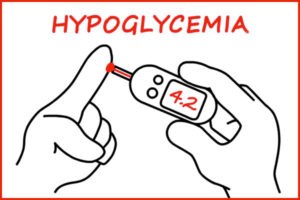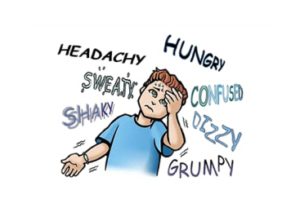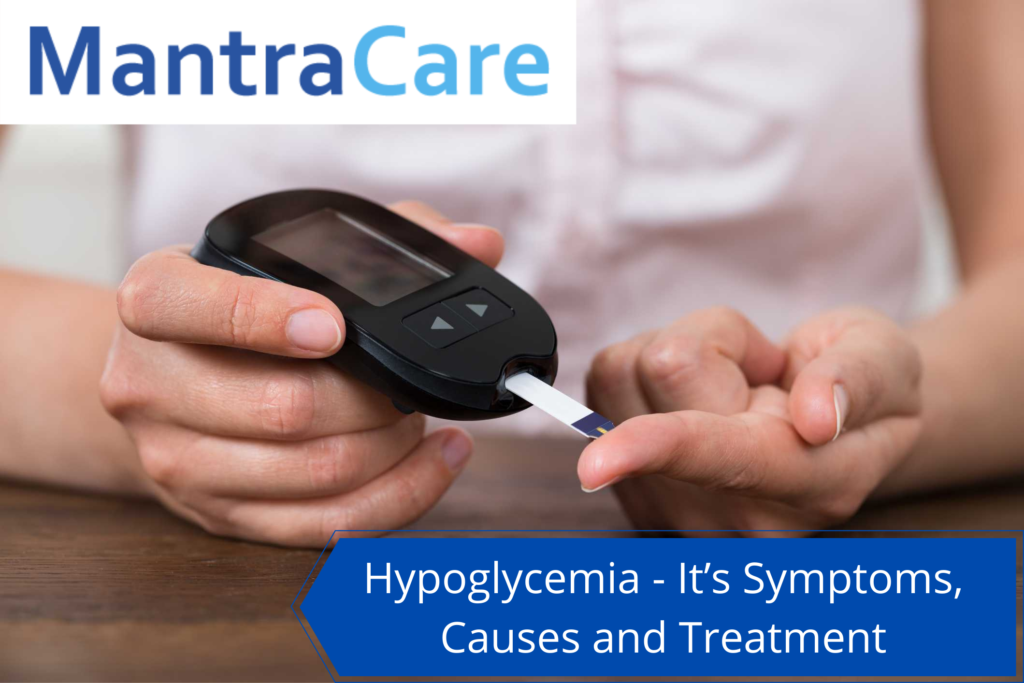Your body extracts elements, minerals, and water from the food you eat, which are the main source of energy. Elements like blood sugar are one of the most important fuels for your body. The presence or absence of these elements in an inappropriate amount can cause various diseases, which are harmful to your body. One of them is hypoglycemia.
Contents
What Is Hypoglycemia?
Hypoglycemia is a condition in which your blood sugar or glucose level decreases more than normal. An increase or decrease in blood sugar level to an extent is completely normal. A minor variation in your blood sugar level is not noticeable and you wouldn’t feel any changes in your body. However, if it goes below the normal range, then it is hypoglycemia or low blood sugar.
A blood sugar level less than 70 mg/dl is considered to be hypoglycemia. However, it may differ from person to person. Your number may differ from this so get tested by your doctor to find out what level of blood sugar is too low for you. When your blood sugar level falls below this you need to take action and bring it back to normal range.

Symptoms of Hypoglycemia
Each person’s symptoms of hypoglycemia may differ. Most people feel symptoms of hypoglycemia when their blood sugar level is 70mg/dl or below this. Take time to note down the symptoms to diagnose yourself. These symptoms may be mild, moderate, and even severe. Severe hypoglycemia is commonly found in people with diabetes.
Mild To Moderate Symptoms

- Confusion
- Shakiness
- Blurred vision
- Sleepy and drowsiness
- Dizziness or lightheadedness
- Paleness
- Feeling weak and tired
- Feeling anxious and nervous
- Non-coordination
- Increased heartbeat
- Lack of concentration
As your brain is dependent on glucose, some symptoms of hypoglycemia can be severe and need immediate attention. A patient with these symptoms will need help from another person.
Severe Symptoms
- Falling unconscious
- Seizures or coma in the worst-case scenario
- Crying out during sleeping
- Unable to eat and drink
Causes of Hypoglycemia
Hypoglycemia is the absence of required blood sugar in the body to function normally. There could be many reasons why your blood sugar (glucose) level drops down. The most common cause is diabetes.
How blood sugar level regulates?
The food you eat is broken down into various sugar molecules including glucose. Glucose is the main source of energy for your body. Glucose or blood sugar enters your body cells from the bloodstream with the help of insulin, which is a pancreatic hormone. Diabetes can cause hypoglycemia by not making enough insulin:
- Diabetes– In Type I diabetes your body does not make enough insulin. In Type II diabetes your body cells are less responsive towards insulin. In both case scenarios, your blood sugar level will increase. To correct this you take insulin or some other medications to lower your blood sugar level. An excessive amount of insulin may cause your blood sugar level to drop too low. This can cause hypoglycemia.
- Eating less– Although our body has extra glucose stored in the liver but eating less regularly especially if you have diabetes can cause low blood sugar.
- Excessive alcohol intake– Drinking excessive alcohol empty stomach can also decrease your blood sugar level. Too much alcohol in your body can block your liver from releasing stored glucose into your bloodstream, and may even damage your liver.
- Medication– Taking medicines like quinine can cause hypoglycemia.
- Food quality– Food with fewer amounts of carbohydrates or composition of fat, protein, and fiber which affect the absorption of carbohydrates can also cause hypoglycemia.
- Hormonal deficiencies– A lack of hormones that regulate glucose production can be a cause of hypoglycemia.
Preventions For Hypoglycemia
You can prevent low blood sugar by taking some precautions like-
- Check your blood sugar regularly- to prevent this you need to monitor your blood sugar. This will help you decide how much you need to eat food and medicine.
- Eat regularly- A balanced meal is a key to a healthy life. To prevent low blood sugar, eat meals in a short interval of time with the right amount of carbohydrates. This will help you in keeping your blood sugar level normal.
- Physical activity- a patient of diabetes need to keep a closer looks on his/her physical activity as it may lower blood sugar during or after the activity. Before doing any heavy exercises, consult your healthcare team.
Diagnosis of Hypoglycemia
If you’re experiencing any symptoms of hypoglycemia, you can diagnose why it’s happening by testing your blood sugar level. If you don’t have diabetes and not taking any medication that can cause hypoglycemia, go to your doctor with the following data:
- Enlist the symptoms you are experiencing along with the food that is included in your diet.
- Tell your doctor your daily routine like the exercises you do.
This information will help your doctor in deciding what is causing low blood sugar. Your doctor may ask you to undergo fasting for some hours to check your blood sugar and symptoms. If blood sugar level increases after a meal your doctor will test your glucose symptoms after you eat.
Treatment of Hypoglycemia
If you feel any symptoms explained above, then treat your low blood sugar immediately. Hypoglycemia can become severe if not treated.
Immediate Treatment For Low Blood Sugar
Drink liquid carbohydrates up to 15-20 grams for immediate relief. Liquid carbohydrates like Glucose are sugars without protein or fat that can be absorbed immediately. You can also try glucose tablets or candy for immediate action. After having some glucose recheck your blood sugar level 15 minutes later. Once your blood sugar level is normal, eating some snacks or meals can help stabilize your blood sugar level to normal.
Treatment For Severe Hypoglycemia
Hypoglycemia is considered severe if you are unable to treat it yourself. If you can’t eat or drink you will need some glucagon (glucose) injection with somebody’s help. An injection of glucagon will bring your blood sugar level to normal. In severe cases of hypoglycemia, you may fall unconscious; therefore you should teach your family members and colleagues about how to give a glucagon injection. A person with hypoglycemia should always keep a hypoglycemia kit with him/her.
Call the ambulance right away if a glucagon shot is unavailable around you.
What Is Unaware Hypoglycemia?
Unaware Hypoglycemia is a condition in which the patient is unaware of a low blood sugar level. It happens when epinephrine secretion is not triggered which helps in detecting low sugar levels. Epinephrine hormone causes sweating, palpitation, anxiety that is the symptoms of hypoglycemia. These symptoms may be unpleasant but they warn the patient of the deep drop in blood sugar level. The patient can only take the measured action to treat lows when symptoms are there. In case of unaware hypoglycemia seizure, unconsciousness, or even brain damage can occur.
Hypoglycemia awareness can be regained by not avoiding any early mild symptoms for some months. This will train your body to react to low blood sugar levels. If it does not seem possible, then talk to your healthcare doctor.
A Word From MantraCare
Do you want to get rid of diabetes? Join our online diabetes consultation program and reverse your Diabetes naturally through lifestyle changes such as a Personalized Diet plan, Exercise, dieticians, and health coaches.


